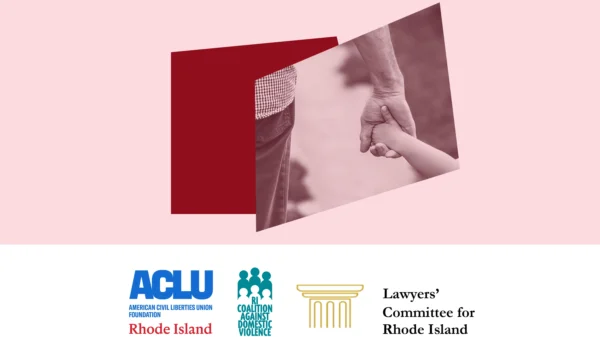New Requirements Threaten Support for Victims of Violence
Attorneys for the Rhode Island Coalition Against Domestic Violence (RICADV) and a nationwide group of 16 other state domestic violence and sexual assault coalitions have asked a federal judge to issue a preliminary injunction against a host of unlawful grant restrictions issued by the Department of Justice’s Office on Violence Against Women (OVW).
The arguments for the injunction were laid out in a recently filed 49-page memorandum, which states that the “new funding conditions are unconstitutional several times over.” The memo claims the new funding conditions violate the Administrative Procedure Act — a law that prohibits “arbitrary and capricious” federal agency actions — and the First Amendment by “seeking to silence disfavored speech.”
The request follows a lawsuit filed by the groups earlier this month in U.S. District Court in Rhode Island, challenging new restrictions on grant funding for domestic and sexual violence prevention services. The lawsuit claims the new restrictions make it impossible for many of the service providers to operate critical safety programs effectively, and threaten to eliminate services that victims of violence rely on in communities across the country.
Critically, many of the requirements for grant funding are in direct contradiction to the Violence Against Women Act (VAWA), which is comprehensive federal legislation to address domestic violence and sexual assault. VAWA mandates and codifies funding sources and requirements for victim services and prevention efforts. Among other restrictions, the new requirements for grant funding bar RICADV and the other organizational plaintiffs from promoting “gender ideology” or any diversity, equity, and inclusion (DEI) programs “that do not advance the policy of equal dignity and respect.” The organizations are also barred from engaging in “activities that frame domestic violence or sexual assault as systemic social justice issues rather than criminal offenses” even though, the brief argues, VAWA’s “foundational recognition” is “that domestic violence is a systemic issue.”
To meet the new requirements defined by the Trump administration — which has warned groups applying for the grants that they could be subject to substantial penalties under the federal False Claims Act if they do not comply — the coalitions would therefore have to alter their programming in ways that would violate VAWA itself.
To illustrate the catch-22 that the coalitions are facing, the memo explains:
For Plaintiffs, the Coalition Grant formula funds amount to hundreds of thousands of dollars in coalitions’ annual budgets. Losing these funds would require coalitions to make staffing cuts that would threaten their ability to operate their programs. Forgoing OVW Grant funds would also harm Plaintiffs’ members, who would no longer be able to provide the same level of assistance, advocacy, and intervention work on which victims of VAWA crimes rely. These losses would be borne most significantly by the thousands of domestic violence and sexual assault victims and their children, who will have more limited or no access to critical, life-saving support.
But if Plaintiffs and their members make the required certifications, they fear immediately exposing their organizations to substantial legal and financial risk, including threatened penalties under the False Claims Act and under various criminal laws, which could jeopardize their ability to provide any services at all.
Imposition of these restrictions would be felt locally in Rhode Island. RICADV, a nonprofit domestic violence membership organization made up of 10 agencies, has received Coalition Grant funds from OVW for over two decades. Under those grants, Congress prescribes a specific amount of money to be distributed to each state-recognized domestic violence and sexual assault coalition, such as RICADV. Without the funds, RICADV would be unable to provide the same level of support and education to domestic violence victims and the community that it currently provides.
The suit was filed by local attorneys representing the ACLU of RI and the Lawyers’ Committee for RI, as well as Democracy Forward, Jacobson Lawyers Group, and the National Women’s Law Center. A list of the numerous state domestic violence and sexual assault coalitions participating as plaintiffs in the case can be found here. To read the memorandum of law and the affidavit provided in the case by RICADV executive director Lucy Rios, please click here.

